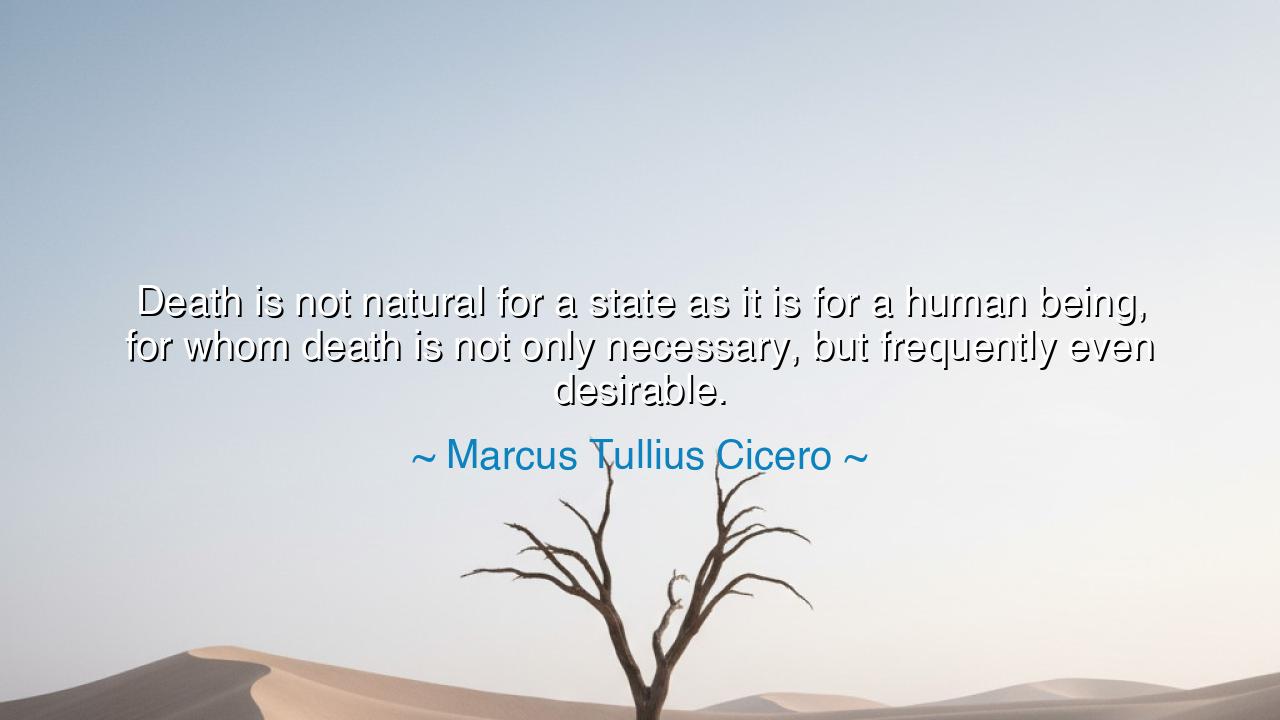
Death is not natural for a state as it is for a human being, for
Death is not natural for a state as it is for a human being, for whom death is not only necessary, but frequently even desirable.






“Death is not natural for a state as it is for a human being, for whom death is not only necessary, but frequently even desirable.” Thus wrote Marcus Tullius Cicero, the great Roman orator, philosopher, and defender of the Republic. In these words, drawn from the turmoil of a dying nation, he reflected on the contrast between the frailty of man and the endurance of state, between the inevitable mortality of the body and the unnatural collapse of a civilization. His thought was not the idle speculation of a scholar—it was the cry of a patriot witnessing the decay of the Republic he loved, a man standing upon the ruins of liberty, watching the light of Rome fade into the darkness of tyranny.
To Cicero, death was the final harmony of human existence—a return to nature’s rhythm. For the individual, death is a certainty written in the laws of the cosmos; it is a release from toil, sometimes even a blessing when life has grown too burdened. The wise man, he said, does not fear death, for it is but the closing of a play well-acted. But a state, a nation, is not meant to die. It is not bound by flesh or time, but by the shared spirit of its citizens, its laws, and its virtues. When such a thing perishes, it is not natural—it is tragic. It is the result of corruption, cowardice, or moral decay. Where a man’s death may bring peace, the death of a nation brings chaos.
In these words, Cicero spoke from experience. He lived in the final days of the Roman Republic, when ambition had devoured honor and power had silenced principle. He had seen Julius Caesar rise as dictator, the Senate humbled, and the Roman people seduced by promises of security in exchange for their freedom. To him, this was not the natural order of the world, but a betrayal of it. A state, unlike a man, should endure through generations, nourished by justice and tempered by wisdom. When it collapses, it is as if the stars themselves fall from the heavens. And Cicero, with his voice of thunder and pen of fire, tried to prevent that fall—though he knew he would perish in the attempt.
History has seen many such deaths. Consider the fall of Athens, once the shining cradle of democracy and art. It did not die from conquest alone, but from within—from greed, from division, from the slow corruption of its ideals. Like Rome after it, Athens forgot that a state lives not by its power or wealth, but by its virtue. Cicero’s words remind us that the decay of a nation is not a natural process—it is a disease of the soul, a moral failing that must be resisted with every breath. When men cease to value truth, when laws become tools of ambition, when citizens trade duty for comfort, the body politic begins to rot.
And yet, Cicero also offers hope within his sorrow. For if the death of a state is not natural, then it can be prevented—or, if it has fallen, it can be reborn. Unlike man, who cannot escape his end, a nation may rise again from its ashes, renewed by virtue and courage. The same spirit that built Rome from a cluster of huts can, when rekindled, rebuild it from ruins. Thus, his lament becomes also a call to vigilance: that citizens must be the guardians of their nation’s soul, for the life of the state depends not upon kings or armies, but upon the integrity of its people.
The wisdom of these words transcends Rome and speaks to all ages. Every civilization stands upon the same precipice, balanced between endurance and extinction. The forces that destroyed the Republic still live today—greed disguised as ambition, comfort mistaken for peace, deceit enthroned as power. When Cicero warns that the death of a state is not natural, he is reminding us that such a fate comes only when men forget their duty, when they surrender truth to convenience. The death of a man is inevitable; the death of a nation is chosen.
So, my friends, let us take this lesson to heart. The body will die, but the state—our shared home, our common good—must be preserved through virtue, sacrifice, and courage. Each generation must earn the right to its inheritance by defending the ideals upon which it stands. Be vigilant in truth, steadfast in justice, and unyielding in principle, for these are the lifeblood of the state. And when the day comes that others grow weary and seek to surrender, remember Cicero’s words: death is not natural for a state—and therefore, we must never allow it.
For though the man may perish, his example endures. Cicero’s own life was cut short by the very tyranny he opposed, yet his words became immortal, guiding the conscience of nations for centuries. Let us, then, live as he taught—to face our own deaths with calm, but to resist, with all the fire of our souls, the death of freedom and of the state. For that death is not natural, nor necessary—and so long as virtue remains alive in even one heart, the nation yet lives.






AAdministratorAdministrator
Welcome, honored guests. Please leave a comment, we will respond soon